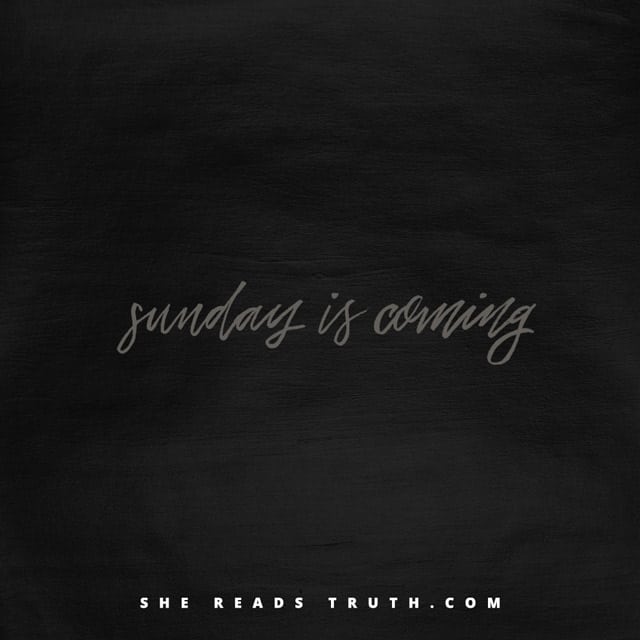Holy Week in Real Time: Holy Saturday
Open Your Bible
Luke 23:54-56, Matthew 27:62-66, Isaiah 53:8-12
BY Guest Writer
Text: Luke 23:54-56, Matthew 27:62-66, Isaiah 53:8-12
Today is the seventh day of the portion of the church calendar commonly known as Holy Week.
In the coming days, we will slow our pace, walking through the events that took place between Palm Sunday and Easter Sunday. Rather than offer personal, written responses to each day’s Scripture reading, we’ve asked our friend, Pastor Russ Ramsey, to provide a real-time summary of the week’s events. Our prayer is that this more descriptive approach will usher you into the narrative and allow space for you to fully engage the beauty and ache of Holy Week.
Take this week slowly and reverently. It is a somber time, but let us never forget: Sunday is coming.
___
The Saturday following Jesus’ crucifixion might be the most unique and overlooked day in the history of the world. It is the day between Jesus’ death and His resurrection.
Less is written in the Gospels about this day than any other in the scope of this week known as Holy Week. But what makes it so unique is this: it is the only full day in history where the body of the crucified Son of God lay dead and buried in a grave.
The day before, He was crucified. The following day He would rise from the grave. But what happened on Saturday? Though we may not know much about this day, when we look at the few verses the Gospels give us accounting for it, we find it was by no means a forgotten day to the Chief Priests who had handed Jesus over to death.
During His earthly ministry, Jesus said many times that He would die in Jerusalem at the hands of the Chief Priests, but on the third day He would rise again (Matthew 12:40, Mark 8:31, 9:31, 10:34). Of course, the Chief Priests scoffed at this. But they didn’t forget it. On the day between Good Friday and Easter Sunday, Jesus’ prediction preoccupied their thoughts in such a way that they couldn’t leave it alone.
Matthew 27:62-66 tells us the strange story of how the Chief Priests simply could not dismiss the possibility that Jesus might have known something they didn’t. They went to Pilate and explained that while Jesus was clearly an imposter, His disciples might try to steal His body and fake a resurrection. Pilate’s response was laced with poetic foreshadowing when he said, “Here is a guard of soldiers. Make the tomb as secure as you can.”
Pilate’s words reminds me of C.S. Lewis who said, “Really, a young Atheist cannot guard his faith too carefully. Dangers lie in wait for him on every side” (Surprised by Joy).
The entire week leading up to the crucifixion was filled with moments in which Jesus’ power, strength, wisdom, and authority challenged many to reconsider what they presumed about Him. He was not easily forgotten. He forced many, including the religious leaders, Pontius Pilate, and His own twelve disciples, to take a close look at what they really believed about who He was.
That Saturday, as His body lay wrapped in linen in a grave, there were many around Jerusalem who sat with uneasy questions about whether or not there would be another chapter in Jesus’ story. His uncommon strength, coupled with the supernatural darkness that settled over the land during His crucifixion (Matthew 27:45), set on edge those who wanted Him dead, even after they’d succeeded. A resurrection would only cause people to believe in Him more.
But then, shouldn’t a resurrection cause people to believe in Him more?
 written by Russ Ramsey
written by Russ Ramsey
adapted from Behold the King of Glory
40 thoughts on "Holy Week in Real Time: Holy Saturday"
-
I have enjoyed your studies! Thank you! But I was disappointed in this day of the study. When you spent time paralleling the story of Jonah to the crucifixion and resurrection, I was excited because I was sure that you would prove to us that Jesus was in the grave three days and three nights just as Jonah was in the fish. I was sure you were going to address the second Sabbath we don’t usually talk about – the Sabbath of the Passover. But when your comment was “it was the only full day in history where the body of the crucified Son of God lay dead and buried in the grave” I was so disheartened to know that the parallel spelled out earlier in the study suddenly lost its relevance. This would have been an excellent opportunity to open eyes as to the Jewish traditions that we have overlooked. That Christ really was in the grave for three days and three nights but our so-called traditions have superseded God’s traditions. I didn’t respond right away but for some reason feel I needed to point this out. I want to follow God’s design for my worship and not man’s traditions.


Post Comments (40)